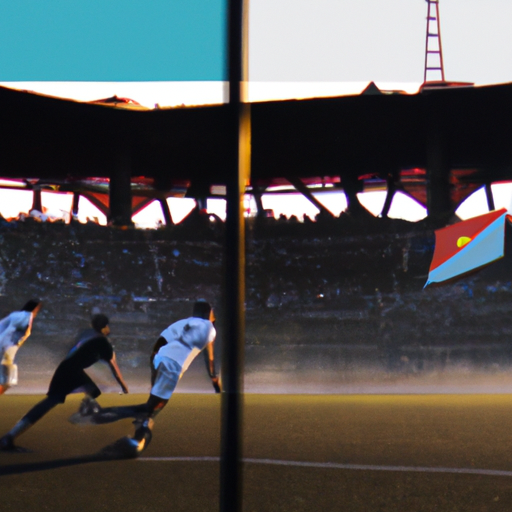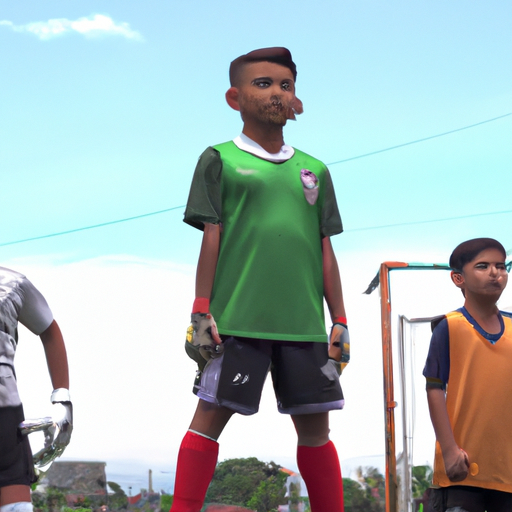Breaking Barriers: Promoting Gender Equality in Filipino Soccer

The Role of Women in Filipino Soccer: Breaking Barriers and Promoting Gender Equality
The Role of Women in Filipino Soccer: Breaking Barriers and Promoting Gender Equality
Soccer, or football as it is commonly known in the Philippines, has long been a male-dominated sport. However, in recent years, there has been a significant push to promote gender equality and break down barriers for women in Filipino soccer. This article will explore the role of women in Filipino soccer and the efforts being made to promote gender equality in the sport.
Historically, women have faced numerous challenges in pursuing soccer in the Philippines. Traditional gender roles and societal expectations have often discouraged girls from participating in sports, especially those considered more physically demanding like soccer. As a result, opportunities for women to play and compete in the sport have been limited.
However, in recent years, there has been a growing recognition of the importance of gender equality in sports, including soccer. Organizations such as the Philippine Football Federation (PFF) and the Philippine Women’s National Football Team have been working tirelessly to promote women’s participation in soccer and provide equal opportunities for female athletes.
One of the key initiatives in promoting gender equality in Filipino soccer is the establishment of women’s leagues and tournaments. These platforms provide female players with the opportunity to showcase their skills and compete at a high level. The PFF Women’s League, for example, was launched in 2016 and has since grown in popularity, attracting more teams and players each year.
In addition to creating opportunities for women to play, efforts have also been made to develop and support female coaches and referees. The PFF has implemented coaching and referee development programs specifically tailored for women, aiming to increase their representation in these roles. By providing training and support, more women are being empowered to take on leadership positions within the sport.
Another important aspect of promoting gender equality in Filipino soccer is changing societal attitudes and perceptions towards women in sports. Education and awareness campaigns have been launched to challenge stereotypes and encourage girls to pursue their passion for soccer. These campaigns highlight the achievements of female athletes and emphasize the importance of equal opportunities for all.
Furthermore, the success of the Philippine Women’s National Football Team has played a significant role in breaking down barriers and inspiring young girls to get involved in soccer. The team’s achievements, such as qualifying for the AFC Women’s Asian Cup, have garnered attention and support, further raising the profile of women’s soccer in the country.
While progress has been made in promoting gender equality in Filipino soccer, there is still work to be done. Continued efforts are needed to ensure equal access to resources, facilities, and opportunities for female players. Additionally, addressing issues such as gender-based discrimination and harassment within the sport is crucial to creating a safe and inclusive environment for all participants.
In conclusion, the role of women in Filipino soccer is evolving, with increasing efforts being made to promote gender equality and break down barriers. Through the establishment of women’s leagues, development programs for coaches and referees, and awareness campaigns, progress is being made to provide equal opportunities for female athletes. However, ongoing efforts are needed to continue challenging societal norms and ensuring a level playing field for all participants. By breaking barriers and promoting gender equality in Filipino soccer, we can create a more inclusive and diverse sporting landscape.
Challenges and Triumphs: Breaking Gender Barriers in Filipino Soccer

Challenges and Triumphs: Breaking Gender Barriers in Filipino Soccer
Gender equality has long been a topic of discussion in various fields, and sports are no exception. In the world of soccer, women have faced numerous challenges in their quest for equal opportunities and recognition. The Philippines, a country with a deep passion for the sport, is no stranger to these struggles. However, recent years have seen significant progress in breaking down gender barriers and promoting equality in Filipino soccer.
One of the main challenges faced by women in Filipino soccer is the lack of support and resources. Historically, soccer has been seen as a male-dominated sport, with limited opportunities for women to participate. This has resulted in a lack of investment in women’s soccer programs, including coaching, training facilities, and financial support. Without these essential resources, it becomes difficult for women to compete at the same level as their male counterparts.
Another challenge is the societal perception of women in sports. Traditional gender roles and stereotypes often discourage women from pursuing athletic careers, including soccer. Women are expected to prioritize their domestic responsibilities over their sporting ambitions, leading to limited opportunities and societal pressure to conform. Overcoming these deeply ingrained beliefs requires a shift in cultural attitudes and the promotion of female athletes as role models.
Despite these challenges, Filipino women have made significant strides in breaking down gender barriers in soccer. The establishment of the Philippine Women’s National Football Team, also known as the Malditas, in 1985 marked a turning point for women’s soccer in the country. This team has since become a symbol of female empowerment and has inspired countless young girls to pursue their dreams in the sport.
In recent years, the Malditas have achieved notable successes on the international stage. They have competed in prestigious tournaments such as the AFC Women’s Asian Cup and the Southeast Asian Games, showcasing the talent and determination of Filipino women in soccer. These achievements have not only brought recognition to the team but have also helped to challenge societal perceptions of women in sports.
Another triumph in promoting gender equality in Filipino soccer is the increasing participation of women in grassroots programs. Local organizations and schools have started to prioritize girls’ soccer, providing them with opportunities to learn and develop their skills. These initiatives aim to create a supportive and inclusive environment for female players, encouraging them to pursue their passion for the sport.
Furthermore, the Philippine Football Federation (PFF) has taken steps to address the gender gap in soccer. The PFF has implemented programs that focus on the development of women’s soccer, including coaching clinics, talent identification camps, and youth leagues. These initiatives not only provide opportunities for women to excel in the sport but also aim to create a sustainable pathway for their continued growth and success.
In conclusion, breaking gender barriers in Filipino soccer has been a challenging journey, but one that is gradually yielding positive results. The lack of support and resources, coupled with societal perceptions, have hindered the progress of women in the sport. However, the establishment of the Malditas and the increasing participation of women in grassroots programs are clear signs of progress. With continued efforts from organizations like the PFF and a shift in cultural attitudes, the future looks promising for gender equality in Filipino soccer. It is crucial to recognize and celebrate the triumphs achieved thus far while remaining committed to further breaking down barriers and promoting equal opportunities for all.
Empowering Female Athletes: Promoting Gender Equality in Filipino Soccer
Breaking Barriers: Promoting Gender Equality in Filipino Soccer
Soccer, also known as football, is a sport that has captured the hearts of millions around the world. In the Philippines, soccer has been gaining popularity in recent years, with more and more young athletes taking up the sport. However, despite the growing interest, there are still significant barriers that prevent female athletes from fully participating and excelling in the sport. This article aims to shed light on the importance of promoting gender equality in Filipino soccer and the steps being taken to empower female athletes.
Gender inequality in sports is a global issue, and the Philippines is no exception. Traditional gender roles and societal expectations often limit opportunities for women and girls to participate in sports, including soccer. Many girls are discouraged from pursuing their passion for the sport due to cultural norms that prioritize domestic responsibilities over athletic pursuits. This not only hinders their personal growth but also deprives the country of potential talent and success in the sport.
Recognizing the need for change, various organizations and initiatives have emerged to promote gender equality in Filipino soccer. One such organization is the Philippine Women’s National Football Team, also known as the Malditas. The Malditas have been instrumental in raising awareness about women’s soccer and advocating for equal opportunities for female athletes. Through their participation in international tournaments and friendly matches, they have showcased the talent and potential of Filipino women in the sport.
In addition to the efforts of the Malditas, the Philippine Football Federation (PFF) has also taken steps to promote gender equality in soccer. The PFF has implemented programs that aim to increase female participation at all levels of the sport, from grassroots development to elite competitions. These programs provide training and support for young female athletes, helping them overcome barriers and pursue their dreams in soccer.
Furthermore, the PFF has been working closely with schools and local communities to create a more inclusive environment for female athletes. By organizing workshops and seminars, they educate coaches, parents, and administrators about the importance of gender equality in sports. These initiatives aim to challenge traditional gender norms and encourage equal opportunities for both male and female athletes.
Another significant development in promoting gender equality in Filipino soccer is the establishment of women’s leagues and tournaments. These platforms provide female athletes with opportunities to showcase their skills and compete at a higher level. By creating a competitive environment, these leagues not only foster talent development but also challenge societal perceptions about women’s capabilities in sports.
While progress has been made, there is still much work to be done to achieve true gender equality in Filipino soccer. It is crucial for all stakeholders, including government agencies, sports organizations, and the media, to continue supporting and promoting female athletes. By providing equal resources, opportunities, and recognition, we can break down the barriers that hinder the growth and success of women in the sport.
In conclusion, promoting gender equality in Filipino soccer is not only a matter of fairness but also a means to unlock the full potential of female athletes. By breaking down societal barriers and challenging traditional gender norms, we can create a more inclusive and empowering environment for women and girls in the sport. Through the efforts of organizations like the Malditas and the PFF, as well as the establishment of women’s leagues and tournaments, we are taking significant steps towards achieving gender equality in Filipino soccer. It is our collective responsibility to continue supporting and empowering female athletes, ensuring that they have the same opportunities and recognition as their male counterparts.





